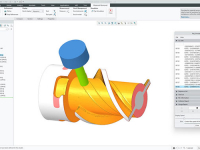
November 14, 2022
Sustainable Packaging
Like most consumer packaged goods companies, innovation is important to win market share and bring new products to market. This requires overcoming challenges related to materials selection, waste reduction, manufacturing, recyclability, and product transportation. Using a combination of modeling and simulation, and advanced rapid prototyping, PepsiCo is working on several initiatives to improve the packaging development process for gains in productivity, quality, and sustainability.
Pepsi is likely one of the first beverages one thinks of when it comes to soft drinks. PepsiCo is much more than just its popular namesake beverage. The corporation has a large Food and Beverage Portfolio, in which twenty-three of the brands—including Pepsi-Cola, Quaker Oats, Tropicana, Lay’s, and Gatorade—are generating more than $1 billion each in retail sales every year. All these brands’ development work involves a lot of processing and packaging—and that’s where simulation plays a large role.
Dr. Ellie Vineyard is an Associate Principal Engineer at PepsiCo, joining the company in 2019. She also made the time to share her expertise as a speaker at the 2021 Regional User Meetings, as well as taking on the role of a SIMULIA Champion. At the time she started with PepsiCo, Dr. Vineyard did not have a great deal of experience in packaging, but she quickly became an expert on beverage packaging, which requires highly precise physics and engineering to create, despite the apparent simplicity of their shapes. “If you don’t take a systematic approach to design bottles, you’re going to see failure after transportation,” she says. “And when the bottles go to consumers’ hands, are you going to pick a bottle with denting on it? We all pick the best bottle on the shelf.”
The Virtual First Principle
Dr. Vineyard and her team are highly involved with each phase of the packaging development cycle, relying on simulation the entire way. First is the ideation phase, in which the industrial design team comes out with a few design iterations for each new packaging design. Dr. Vineyard’s team uses simulation to perform a design iteration analysis and select the best design among all the design iterations.
Fill out the information below to download the resource.
Latest News






